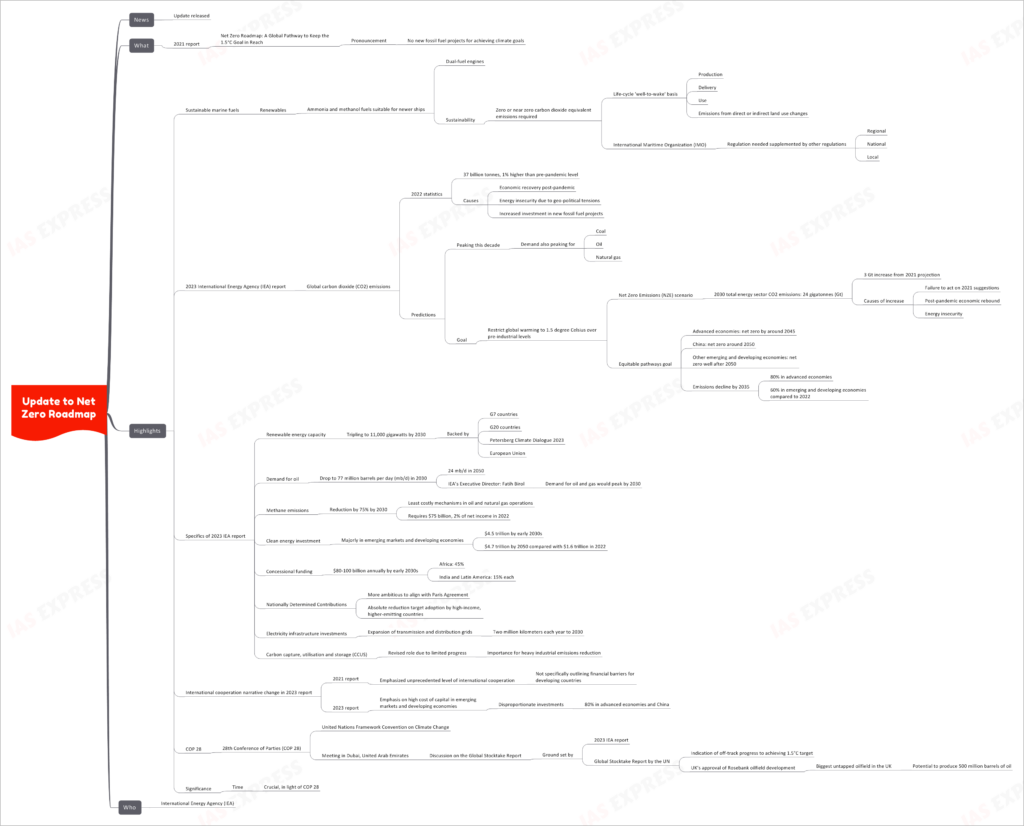Update to Net Zero Roadmap

The release of the update to the “Net Zero Roadmap: A Global Pathway to Keep the 1.5°C Goal in Reach” report by the International Energy Agency (IEA) in 2023 has brought important insights and changes to the ongoing efforts to combat climate change. This update emphasizes the critical need for sustainable practices, renewable energy sources, and global cooperation to achieve net-zero emissions and restrict global warming to 1.5 degrees Celsius above pre-industrial levels.
Sustainable Marine Fuels
One of the key highlights of the update is the emphasis on sustainable marine fuels, specifically renewables like ammonia and methanol. These fuels are deemed suitable for newer ships equipped with dual-fuel engines. To be considered sustainable, these fuels must achieve zero or near-zero carbon dioxide equivalent emissions on a life-cycle ‘well-to-wake’ basis, taking into account production, delivery, use, and emissions associated with land use changes. The International Maritime Organization (IMO) plays a crucial role in regulating these fuels, with the need for supplementation by regional, national, and local regulations.
Global Carbon Emissions Statistics
The update presents statistics on global carbon dioxide (CO2) emissions in 2022, indicating a 1% increase from the pre-pandemic level, reaching 37 billion tonnes. Factors contributing to this increase include post-pandemic economic recovery, energy insecurity driven by geopolitical tensions, and increased investment in new fossil fuel projects. The report predicts that global carbon emissions will peak in this decade, with a focus on restricting global warming to 1.5 degrees Celsius above pre-industrial levels.
Specifics of the 2023 IEA Report
- Renewable Energy Capacity: The report envisions tripling renewable energy capacity to 11,000 gigawatts by 2030, supported by G7 and G20 countries, the Petersberg Climate Dialogue 2023, and the European Union.
- Oil Demand: The update forecasts a drop in oil demand to 77 million barrels per day (mb/d) by 2030 and 24 mb/d by 2050, with a peak in demand expected by 2030.
- Methane Emissions: There is a call for a 75% reduction in methane emissions by 2030, primarily in oil and natural gas operations, requiring an investment of $75 billion, equivalent to 2% of net income in 2022.
- Clean Energy Investment: Significant investments in emerging markets and developing economies are anticipated, reaching $4.5 trillion by the early 2030s and $4.7 trillion by 2050, compared to $1.6 trillion in 2022.
- Concessional Funding: The report suggests providing $80-100 billion in concessional funding annually by the early 2030s, with a focus on Africa (45%), India, and Latin America (15% each).
- Nationally Determined Contributions: The update calls for more ambitious nationally determined contributions (NDCs) in alignment with the Paris Agreement, including the adoption of absolute reduction targets by high-income, higher-emitting countries.
- Electricity Infrastructure: The report recommends the expansion of transmission and distribution grids, with the goal of adding two million kilometers each year until 2030.
- Carbon Capture, Utilisation, and Storage (CCUS): The role of CCUS is revised due to limited progress, emphasizing its importance in reducing emissions from heavy industries.
Change in International Cooperation Narrative
The update highlights a shift in the narrative regarding international cooperation. While the 2021 report emphasized an unprecedented level of cooperation, the 2023 report underscores the high cost of capital in emerging markets and developing economies, which leads to disproportionate investments in advanced economies and China.
COP 28
The report’s significance is underscored by the upcoming 28th Conference of Parties (COP 28) under the United Nations Framework Convention on Climate Change, to be held in Dubai, United Arab Emirates. During this event, discussions will revolve around the Global Stocktake Report, which has been influenced by the findings of the 2023 IEA report. The Global Stocktake Report indicates that progress toward achieving the 1.5°C target is off track, raising concerns.
If you like this post, please share your feedback in the comments section below so that we will upload more posts like this.

